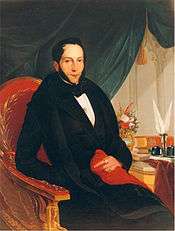Mihael Stroj

Mihael Stroj (30 September 1803, Ljubno – 19 December 1871, Ljubljana) was a Slovenian painter.
Life

with Mihael Stroj's work
Mihael Stroj was born the fifth of eight children to Anton Stroj and his wife Marija, née Kokal. He spent his childhood in Ljubno in Upper Carniola. In 1812, his mother died of exhaustion. Shortly thereafter, his father remarried, sold his property in Ljubno and moved to Ljubljana with his family. Mihael Stroj attended the Glavna vzorna šola, where he completed the fourth class in 1817 with very good grades. He then joined the so-called artists’ class, which he concluded in 1820 with distinction. He continued his schooling in Vienna, where he enrolled in the Academy of Fine Arts in 1821. The first of his works known to have survived, a sketch of a head and a self-portrait, date from this period. It is known that Stroj was still a student at the Academy of Fine Arts in 1825, but it is not known whether he concluded his studies there.
In 1830, Stroj spent time in Zagreb, where he offered his services to the nobility and bourgeoisie as a portraitist. Because of the numerous commissions that he received, he remained in Zagreb. He lived in Croatia (with intermittent stays in Slovenia) until 1842. In this period, he painted not only a large number of portraits, but also works with religious content, including altar pictures for churches in Vugrovec and Nova Rača.
In Croatia, Stroj was exposed to the ideas of Illyrism and associated with members of the Illyrian movement, including Stanko Vraz, Djuro Jelačić, the Ožegović family and others.
In 1841, Stroj married Margareta Berghaus, which whom he had five daughters. The following year, he returned to Ljubljana, where he continued to paint portraits of important members of the local bourgeoisie, although he also received further commissions from Croatia. He died in his house in Ljubljana after suffering multiple heart attacks.
Work


Mihael Stroj was one of the most prominent Slovenian painters of the 19th century. His art reflects the Classicism and the Romanticism of his day, but the influence of the Biedermeier style is also visible. Most of his works are oil paintings.
Portraits of rich members of the bourgeoisie in Ljubljana and in Zagreb made up the majority of his work, although he also painted religious motives, genre works and historical themes. Some of his paintings are listed below.
Portraits
- J. Martinčič (1830)
- Djuro Jelačić (1832)
- Karlo Jelačić (1834)
- Stjepan Ožegović (1837)
- Julijana Gaj (1838)
- Mož z rdečo ovratnico (1840)
- Stanko Vraz (1841)
- Dr. Blaž Crobath (1842)
- Mihael Ambrož (1850)
- Luiza Pesjakova (around 1855)
- Škof Anton Alojzij Wolf (1857)
- Ljubljanska meščanka (1858)
- Škof Mirko Karlo Raffay (around 1830)
- Škof Juraj Haulik (1840)
Genre and historical works
- Izpad iz trdnjave Siget (1820s)
- V kovačnici (1838)
- Historični prizor (?)
- Vilinski ples (?)
- Orientalka (?)
Religious works
- Božja skrb (1842)
- Marija pomagaj (?)
- Marija z Jezusom na prestolu (1857)
- Sv. Florijan (around 1855)
- Sv. Anton Puščavnik (1863)
Paintings
- Mihael Stroj's works
 Azija
Azija Portrait of Luiza Pesjak II
Portrait of Luiza Pesjak II Portrait of a man
Portrait of a man Kristofor Stanković
Kristofor Stanković Therese Proch
Therese Proch Europa
Europa
References
| Wikimedia Commons has media related to: |
- Mihael Stroj – 1803–1871, (retrospektivna razstava, Ljubljana, Narodna galerija, 26. marec – 16. maj 1971), Ljubljana, Narodna Galerija, 1971
- Klasicizem in romantika na Slovenskem, Ljubljana, Narodna galerija, 1954
- Stele France, Slovenski slikarji, Ljubljana, Slovenski knjižni zavod, 1949
- Komelj Milček, Obrazi – slovensko slikarstvo XIX. stoletja = Gesichter – slowenische Malerei im XIX. Jahrhundert
- Komelj Milček, Božja skrb – Mihael Stroj: Božja skrb, Vzgoja, Leto 6, št. 22 (jun. 2004), str. 36.